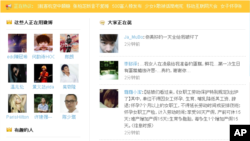China's largest microblogging service is unveiling a controversial new set of guidelines that aims to officially restrict what its users can post online.
Sina Weibo, a Twitter-like service with 300 million users, has been under increasing government pressure in recent months to more aggressively censor its content.
Earlier this week, it unveiled a wide-ranging user contract that, among other things, forbids posting material that is "untrue," "threatens the honor of the nation," "promotes evil teachings, or "destroys societal stability."
Many Chinese web users have reacted negatively to the guidelines, saying they will restrict free speech. But others say the contract, which is to be implemented later this month, simply places in writing restrictions that are already in place.
Chad Catacchio, a U.S.-based blogger who follows China tech stories, says that the move could even be viewed positively, because it represents a rare step towards more transparency in China's often subjective world of Internet censorship.
"These kinds of rules have existed for a while on the Internet in China, so I wouldn't say anything [in the contract] is necessarily a surprise," said Catacchio. "I think one thing that is on the positive side is that they are putting it in writing publicly, but what that means and if that's good for the users, that's yet to be seen."
Sina Weibo, which already employs a large "rumor control team," recently pledged to work more with government censors to squash out online rumors.
Last month, it was among several Chinese microblog services punished by the Chinese government for failing to adequately restrict false rumors of a political coup.
China's massive network of Internet censors, dubbed the Great Firewall of China, has been working overtime in recent months as the date for a once-in-a-decade leadership transition in the Communist Party draws closer.
In March, Beijing introduced new rules requiring all of the country's microblog users to register using their own names, in an effort to better control what is being posted online. But many of the country's microblog services have struggled to enforce the rule.
Popular Western social media websites such as Facebook and Twitter are blocked in China.
Sina Weibo, a Twitter-like service with 300 million users, has been under increasing government pressure in recent months to more aggressively censor its content.
Earlier this week, it unveiled a wide-ranging user contract that, among other things, forbids posting material that is "untrue," "threatens the honor of the nation," "promotes evil teachings, or "destroys societal stability."
Many Chinese web users have reacted negatively to the guidelines, saying they will restrict free speech. But others say the contract, which is to be implemented later this month, simply places in writing restrictions that are already in place.
Chad Catacchio, a U.S.-based blogger who follows China tech stories, says that the move could even be viewed positively, because it represents a rare step towards more transparency in China's often subjective world of Internet censorship.
"These kinds of rules have existed for a while on the Internet in China, so I wouldn't say anything [in the contract] is necessarily a surprise," said Catacchio. "I think one thing that is on the positive side is that they are putting it in writing publicly, but what that means and if that's good for the users, that's yet to be seen."
Sina Weibo, which already employs a large "rumor control team," recently pledged to work more with government censors to squash out online rumors.
Last month, it was among several Chinese microblog services punished by the Chinese government for failing to adequately restrict false rumors of a political coup.
China's massive network of Internet censors, dubbed the Great Firewall of China, has been working overtime in recent months as the date for a once-in-a-decade leadership transition in the Communist Party draws closer.
In March, Beijing introduced new rules requiring all of the country's microblog users to register using their own names, in an effort to better control what is being posted online. But many of the country's microblog services have struggled to enforce the rule.
Popular Western social media websites such as Facebook and Twitter are blocked in China.
Some information for this report was provided by AP, AFP and Reuters.





